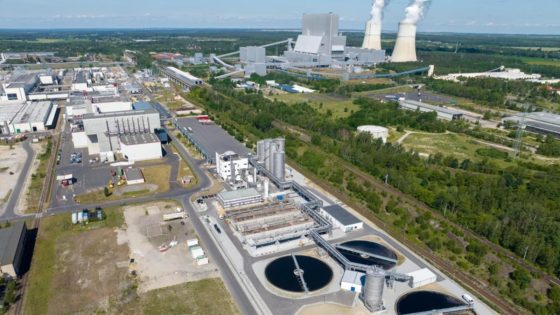Altech Batteries has inked a letter of intent (LOI) to supply 30 of its 1MWh Cerenergy GridPack sodium chloride batteries annually to be used at a major German industrial park for energy storage as part of a five-year deal starting in 2027.
The agreement, which will relate to the first five years of production from Altech’s planned 120MWh factory, has been struck with consultancy firm Zweckverband Industriepark Schwarze Pumpe (ZISP), which oversees the park in the Lusatia region of south-east Germany. It represents Altech’s first offtake deal for its batteries that are made using the sodium ions found in common table salt.
The LOI also incorporates a broader scope of work aimed at upgrading the coal-dependent Schwarze Pumpe Industrial Park into a renewable energy hub. It is anticipated that Altech’s batteries could also play a leading role in storing and managing energy generated from wind and solar power in the wider area.
The deal with ZISP is not only good news for Altech, but also pivotal for Lusatia as a region that has always relied on coal for its industrial power needs.
The alliance with ZISP has been primarily driven by Germany’s overall “Energiewende”, or transition initiative, which is pushing to move the country away from coal and other fossil fuels in favour of sustainable energy sources. Currently, 25 per cent of its energy needs are met from coal-fired power, which has doubled after its supply of gas was choked off at the start of the war with Ukraine.
The interest shown by the Schwarze Pumpe Industrial Park Association (ZISP) in our technology is a clear signal of growing demand for innovative energy storage solutions, particularly as industries shift toward 100% renewable energy. It’s encouraging to see potential customers like ZISP recognise the value of our scalable and reliable battery systems.
Tan says the LOI validates the commercial potential of the company’s batteries and also supports its future growth strategy by strengthening its ability to attract project financing. He believes the partnership will be “just the beginning” in what he expects to be a significant increase in battery demand.
Germany is changing its legislation to phase out coal in line with the European Union’s “Zero Valley” initiative. The scheme provides for the certification of projects such as the Schwarze Pumpe park as models for renewable energy storage and use.
Sodium chloride batteries are relatively new in the field of energy storage. As solid-state units, they are fire and explosion-proof, have a lifespan of more than 15 years and can operate under extreme conditions, making them a safer and more sustainable alternative to lithium-ion batteries.
In addition to Cerenergy, Altech is developing its Silumina Anodes project, which is focused on improving the performance of lithium-ion batteries with the addition of silicon. The company believes such an innovation could boost battery energy capacity by as much as 30 per cent, reducing the range anxiety that is often cited as an obstacle by customers thinking about buying an electric vehicle (EV).
Large-scale and cost-effective battery storage technology has long been seen as the bottleneck issue for the more rapid roll-out of green energy. However, it seems Altech may well have put itself in a leading position to help the shift in energy technology towards renewable solutions, especially if it continues to win key agreements such as the one with ZISP.
Is your ASX-listed company doing something interesting? Contact: [email protected]
Source Agencies


